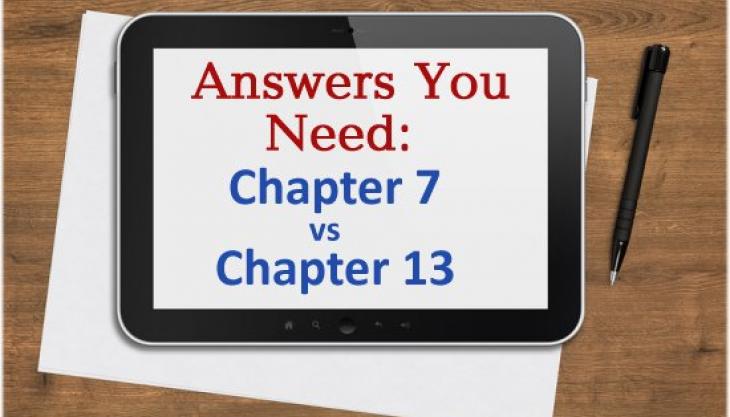Bankruptcy Explained: The Difference Between Chapter 7 and Chapter 13
Submitted by Rachel R on Tue, 03/04/2014 - 1:10pm

The difference between chapter 7 and 13 bankruptcy
When we have new clients come into the office, they are usually deep in debt, dealing with stressful collections calls and letters, and aren't sure where to turn. They know that bankruptcy can relieve debts, but many don't know there are two different options available – chapter 7 or 13. Of those that know there are two options, most don't know the real differences between the two. So today, let's look at the differences, similarities and which may be more beneficial to you.
Similarities Between Chapter 7 and 13
Both require pre-filing credit counseling. This is mandatory. It can be done in our office or at home, but it's not optional. This may sound like a roadblock but, in fact, it's informative and can help you start to get a grip on where your finances went astray and how to get them back on track. Both plans involve a Trustee that will review your petition and administer your bankruptcy. Both plans can allow you to keep your home depending on how current you are on your mortgage – the same goes for your vehicle. In either plan, child support and alimony will survive the filing. Student loans and back income taxes may be dischargeable with either, depending on how you file and the nature of your delinquency. Both chapters will be reflected on your credit report and can stay there for up to 10 years.
Differences Between Chapter 7 and 13
The primary difference between the two plans is debt discharge. With chapter 7, nearly all of your unsecured debts are discharged. Credit card bills, medical bills, payday loans and furniture loans will be 100% discharged right away (as long as you didn't generate the debt just prior to filing bankruptcy). Your car loan and mortgage can survive a chapter 7 as long as you are current on payments. If you are way behind on them, it's likely you will have to surrender the property as part of your bankruptcy. But the plus is that any outstanding balance owed on the car or home will be wiped out in the chapter 7.
With a chapter 13, your attorney will develop a payment plan that the Trustee will review and approve. This can be as short as three years but, more typically, will last five years. The primary beneficiaries of the repayment plan are your secured creditors (mortgage and car creditors), your attorney (if your fees are part of the plan rather than you paying the fee up-front) and any court costs. If there are leftover funds, these will be apportioned out to your unsecured creditors (credit card issuers, medical creditors, etc). At the end of your plan, remaining unsecured debt not paid by the plan will be discharged. Remaining secured debt (such as your mortgage) will survive the chapter 13 and continue per your loan agreement.
Student Loans and Taxes in Bankruptcy
In either a chapter 7 or 13, you may be able to get relief on student loans, but it's much more likely on a chapter 7. This requires a separate filing called an adversary proceeding where you basically file a lawsuit against your student loan issuer to try and get some or all of your loans discharged. If you are living in poverty, you may get relief. If your money is tight, you may get partial relief. If you make a good wage and are just in a tight spot now, don't expect any help. With past due income taxes, to get relief, the tax returns must have been filed on time and the debt outstanding for a while. If this is the case, you may be able to get these discharged under either chapter.
Chapter 7 is better for those that have a lot of unsecured debts and very little disposable income. Those who are unemployed or on a limited fixed income are also good candidates for this chapter. If you are earning a steady wage, but have just gotten behind on your debts, chapter 13 may be a better fit. But the good news is, you don't have to figure this out on your own. Contact the law offices of John T Orcutt for a free consultation on your debt circumstances and to find out which bankruptcy chapter is a better fit for you.
Debts Hurt! Got debt? Need help? Get started below!
Serving All of North Carolina
- Bankruptcy Attorneys Raleigh NC (North)
- Bankruptcy Attorney Fayetteville NC
- Bankruptcy Attorney Durham NC
- Bankruptcy Attorneys Wilson NC
- Bankruptcy Attorneys Greensboro NC
- Bankruptcy Attorneys Southport NC
- Bankruptcy Attorneys Wilmington NC
Bankruptcy Attorneys Raleigh NC (North)
6616 Six Forks Rd #203 Raleigh, NC 27615 North Carolina
Tel: (919) 847-9750

Bankruptcy Attorney Fayetteville NC
2711 Breezewood Ave Fayetteville, NC 28303 North Carolina
Tel: (910) 323-2972

Bankruptcy Attorney Durham NC
1738 Hillandale Rd Suite D Durham, NC 27705 North Carolina
Tel: (919) 286-1695


Bankruptcy Attorneys Greensboro NC
2100 W Cornwallis Dr. STE O Greensboro, NC 27408 North Carolina
Tel: (336) 542-5993

Bankruptcy Attorneys Southport NC
116 N Howe St. Suite A Southport, NC 28461 North Carolina
Tel: (910) 218-8682

Bankruptcy Attorneys Wilmington NC
116 N. Howe Street, Suite A Southport, NC 28461 North Carolina
Tel: (910) 447-2987
